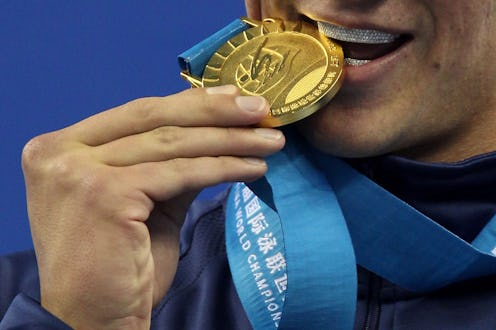News
Olympians Bite Their Medals For This Simple Reason
There are few constants in the Olympics. Every four years, there are new athletes to watch, different competing countries, and a new host city, making each year's games unique. Among all these changes, however, one thing stays the same: Upon bringing home the gold, the winning athletes, no matter what sport they play or what country they represent, bite down on their medals. This strange tradition has viewers wondering: Why do Olympians bite their medals? There seems to be an alarmingly simple answer.
According to David Wallechinsky, president of the International Society of Olympic Historians, Olympic champions, it's probably just because photographers ask them to.
"It's become an obsession with the photographers," Wallechinsky told CNN. "I think they look at it as an iconic shot, as something that you can probably sell. I don't think it's something the athletes would probably do on their own."
Twelve-time Olympic medalist Natalie Coughlin knows a thing or two about appeasing the paparazzi after a big win. "They wear you down and they make you bite it," the swimmer said in an NBC video. "That's why you see all those pictures of people biting the medal, it's not like we just come up [on the stage] and we bite it. They make you do it."
That doesn't mean there's absolutely no historical precedent behind the medal-biting. Traditionally, people would bite down on precious metals to test their authenticity. Pure gold is a soft metal — so soft that biting down on it would leave a noticeable mark.
Gold scores a 2.5 on the Mohs scale of mineral hardness, a comparable scale of measure which relates pairs of materials according to which one will scratch the other. Dental enamel is harder than gold, scoring a 5 on the scale, for reference.
But the gold medals won by top-ranking athletes like Simone Biles and Katie Ledecky aren't made of pure gold — they're alloys. Gold medals haven't been made of solid gold since the 1912 Olympics. How much real gold is in the medals varies from year to year; this year, they're made up of just 1.34 percent gold. The rest of the medal is 93 percent silver and 6 percent copper.
Since silver is a much harder metal than gold, Olympians won't make a dent when they bite down on their medals. In fact, at the 2010 Vancouver Winter Olympics, German luger David Moeller broke his tooth while biting down on his silver medal.
When gold-winning Olympians inevitably bite down on their medals this year, hopefully they won't chip a tooth in the process — or dent their medals.
